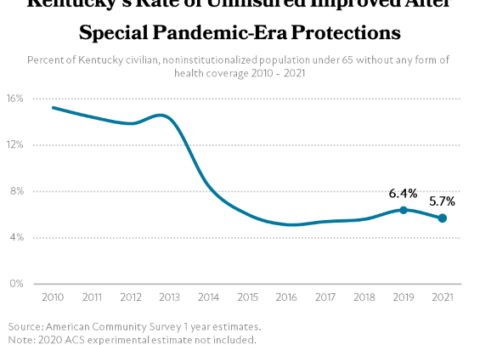The Supplemental Nutrition Assistance Program (SNAP) — through which more than half a million Kentuckians get help buying groceries — is a powerful health intervention, according to a new report from the Kentucky Center for Economic Policy (KCEP).
“By reducing food insecurity and freeing up family resources for other expenses like better housing and needed medicine, SNAP helps make us healthier,” KCEP Policy Analyst and the report’s author Dustin Pugel, said. “At a time when multiple new state and federal changes are restricting access to SNAP, it’s especially important to understand how SNAP is a powerful tool in our public health toolbox.”
According to the report, Kentucky has 8th highest rate of food insecurity in the nation with the share of Kentuckians who are food insecure ranging from about 1 in 13 in Oldham County to 1 in 4 in Magoffin County. A growing body of research connects food insecurity to negative health outcomes such as higher rates of diabetes, chronic illnesses, hypertension and poor mental health, sleep and oral health. For kids, food insecurity is additionally related to anemia, asthma and behavioral challenges; and seniors who are food insecure have roughly the same quality of life as someone 14 years older.
Reduced health from food insecurity also harms our economy. The Centers for Disease Control and Prevention estimates that Kentucky spent $855 million on food insecurity-related health care in 2016. These costs are especially high in rural, eastern Kentucky where food insecurity is more prevalent.
People participating in SNAP, on the other hand, spend about 25% less on health care annually than similar non-participating adults. According to research, they report better health and are less likely to stay home sick or to need medical attention, even as they are less likely to forego needed care because of the cost. Among seniors who participate compared to those who don’t, hospitalization is reduced as is the likelihood they cut back on needed medications.
“SNAP addresses the health problems that stem from not having enough to eat.” said Pugel. “SNAP is a federally funded program that can reduce what Kentucky spends on public health programs. It’s an unequivocal win-win.”
Because SNAP provides assistance to those facing the most barriers to food security and health, it is also an important health equity intervention. One in four Black and Hispanic Kentuckians participates in SNAP, while one in seven white Kentuckians participates. Similarly, Kentuckians who live in economically distressed rural, eastern Kentucky are more likely to participate in SNAP than people who live in the Golden Triangle.
“Restricting access to SNAP harms folks’ health and it deepens systems of inequity that have led to the health disparities Kentuckians experience today,” said Pugel. “Instead of doing things like adding layers of red tape, counting small amounts of savings against folks’ eligibility and frightening mixed immigration-status families out of participating, we should be making Kentucky as healthy as possible by making SNAP as accessible as possible.”
The report recommends, for example, lifting the state-level ban on SNAP participation for Kentuckians who have served their time for a drug-related felony.
Click here to view the full report, SNAP Is Good for Kentuckians’ Health.

